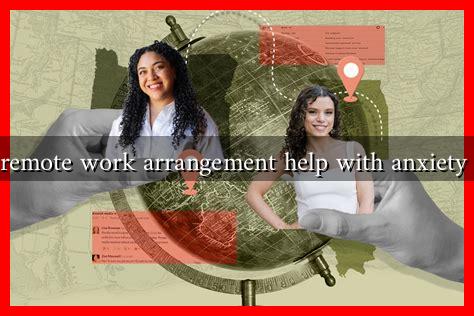-
Table of Contents
Can a Remote Work Arrangement Help with Anxiety Issues?
In recent years, remote work has transitioned from a niche arrangement to a mainstream practice, especially accelerated by the COVID-19 pandemic. While the flexibility of working from home offers numerous benefits, one of the most significant advantages is its potential to alleviate anxiety issues. This article explores how remote work can positively impact mental health, particularly for those struggling with anxiety.
The Link Between Work Environment and Anxiety
Anxiety disorders are among the most common mental health issues, affecting millions of people worldwide. According to the Anxiety and Depression Association of America, approximately 40 million adults in the U.S. experience anxiety disorders. Traditional office environments can often exacerbate these issues due to various stressors, including:
- High-pressure deadlines
- Office politics and interpersonal conflicts
- Commute-related stress
- Distractions and noise in open office spaces
These factors can create a breeding ground for anxiety, making it difficult for individuals to perform at their best. Remote work, however, can provide a more controlled and personalized environment that may help mitigate these stressors.
Benefits of Remote Work for Anxiety Management
Remote work arrangements can offer several benefits that contribute to reduced anxiety levels:
- Flexible Schedule: Remote work often allows for more flexible hours, enabling individuals to work during their most productive times. This flexibility can help reduce the pressure of strict deadlines and allow for better work-life balance.
- Comfortable Environment: Working from home allows individuals to create a workspace that suits their needs, whether that means a quiet room, a cozy corner, or even a local café. This comfort can significantly reduce anxiety levels.
- Reduced Commute: Eliminating the daily commute can save time and reduce stress. According to a study by the U.S. Census Bureau, the average one-way commute in the U.S. is about 27 minutes. This time saved can be redirected towards self-care or relaxation.
- Increased Autonomy: Remote work often comes with greater autonomy, allowing individuals to manage their tasks and responsibilities in a way that suits them best. This sense of control can be empowering and reduce feelings of anxiety.
Case Studies and Statistics
Several studies have highlighted the positive impact of remote work on mental health. A survey conducted by Buffer in 2021 found that 32% of remote workers reported improved mental health as a primary benefit of working from home. Additionally, a study published in the Journal of Occupational Health Psychology found that employees who worked remotely experienced lower levels of stress and anxiety compared to their in-office counterparts.
Moreover, companies that have adopted remote work policies have reported increased employee satisfaction and retention rates. For instance, a case study of a tech company that transitioned to a fully remote model found that employee turnover decreased by 25% within the first year, largely attributed to improved mental well-being.
Challenges of Remote Work
While remote work can alleviate anxiety for many, it is not without its challenges. Some individuals may experience:
- Isolation: Working from home can lead to feelings of loneliness and disconnection from colleagues.
- Blurred Boundaries: The lack of a clear separation between work and personal life can lead to burnout.
- Overworking: Some remote workers may struggle to “switch off,” leading to increased stress levels.
To combat these challenges, it is essential for remote workers to establish boundaries, maintain social connections, and prioritize self-care.
Conclusion
In summary, a remote work arrangement can significantly help individuals manage anxiety issues by providing a flexible, comfortable, and controlled work environment. While it is not a one-size-fits-all solution, the benefits of remote work—such as reduced commute stress, increased autonomy, and a personalized workspace—can contribute to improved mental health for many. However, it is crucial to remain aware of the potential challenges and take proactive steps to maintain a healthy work-life balance. As we continue to navigate the evolving landscape of work, understanding the mental health implications of remote arrangements will be vital for both employees and employers.
For more information on managing anxiety in the workplace, consider visiting the Anxiety and Depression Association of America.

